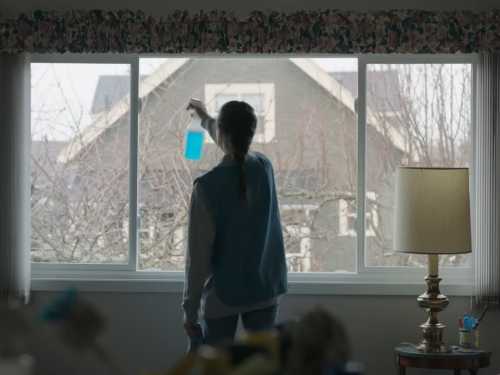
Almost no one notices housemaids. The rich perceive them only as “robots” who come to their homes, do their job and disappear. However, housemaids are just as human as their clients. They hear and see everything. Therefore, they know even more about the lives of their employers than their close relatives.
An ambitious and talented girl who dreams of becoming a writer, Stephanie Land was going through hard times. At the age of 20, she became a single mother, and to make ends meet, she decided to get a job as a housekeeper in the US state of Washington. And this meant hours of grueling work, cleaning kitchens and bathrooms in the luxurious homes of the American elite.
She almost never spoke to her employers. Moreover, she is not sure that some of them even remembered her name. But Stephanie learned a lot about these people – even more than she would have liked. She sorted through their medicine cabinets and dusted off the shelves of photographs, gradually immersing herself in the tragedies of their past, financial difficulties and family secrets.
Stephanie's work was quite monotonous, so the girl often replayed in her head some events and details of her employers' lives in an attempt to put together the complete picture.
“It was a way to have fun at a boring job where I felt lonely,” she says. “Of course, I started thinking a lot about these people [the rich]. I think it was just normal human nature speaking to me. I started to get to know my clients in ways that even their relatives didn’t know them from.”
In her head, Stephanie came up with nicknames for the mansions she worked in and the people who lived in them—“The House of Sorrow,” “The Farmlands,” “The Chef’s House.” But none captivated her more than “The Cigarette Lady,” a middle-aged housewife who lived with her construction magnate husband in a mansion near a golf course.
Everything in this woman's life was perfect. Even her hair and makeup looked like she had just left the beauty salon five minutes ago. On the first floor, there was a photo of her with Tiger Woods (an American golfer who has won 15 majors). She was wearing a fashionable shirt and shorts set, the unofficial “uniform” of the elite of the American country club, Stephanie noticed. The furniture in the house was sleek, modern, and, of course, spotlessly clean. So clean that Stephanie was surprised that she had even been hired to clean here.
One day, the girl found a light brown cashmere cardigan in the closet that belonged to the landlady. Stephanie liked it so much that she couldn’t resist trying it on. Admiring herself in the mirror, she imagined herself living this woman’s beautiful life, in a sense borrowing her personality.
However, the landlady had a secret. First, Stephanie discovered traces of cigarette ash near the house, and then she found an ashtray behind the kitchen sink. A perfectly clean ashtray, which had been carefully washed until it sparkled. But Stephanie did not see the cigarettes themselves anywhere until the day she decided to leave the house through the garage and came across a freezer. She opened it and, finally, found indisputable evidence of the “crime” – a pack of thin cigarettes of a prestigious brand. Stephanie smiled with satisfaction.
“I imagined her, with her chin resting on her hand, smoking a cigarette… Then she stood up, straightened her hair a little and shook the ash out of the ashtray, and then wiped it thoroughly,” Stephanie recalled in her memoirs. “It wasn’t even about the smoking. I was fascinated by all the secrecy built around this process. The amount of energy this woman put into continuing to maintain the illusion of her impeccably clean life.”
Stephanie Land’s 2019 memoir, “Housekeeper: Hard Work, Low Pay, and a Mother’s Will to Survive,” not only became a bestseller, but also made many employers wonder how much housekeepers really know about them. Stephanie received countless letters from people who had staff and were shocked—perhaps even horrified—by her revelations about the lives of the elite.
About 10 production companies were interested in Stephanie's book. In the end, Netflix bought the rights to the film adaptation, and in the fall of 2021, the streaming platform released the series “Cleaner. The Story of a Single Mother,” based on the life of Stephanie Land. The main role was played by Margaret Qualley.
Stephanie sincerely hopes that the series will be able to show the real life of the elite service staff – that group of people who do the hard daily work, but remain “invisible.”
“I just know how much this kind of work is undervalued,” Stephanie explains.
Unlike most other housemaids, Stephanie grew up in a middle-class family in Alaska. When she came of age, she got a job at a cafe. But Stephanie's real dream was to become a famous writer one day. She recalled driving to her next shift, leafing through The New York Times Book Review, and studying pamphlets with instructions for writing the creative exam at the University of Montana. However, a series of unforeseen events forced Stephanie to change her life plans.
She unexpectedly became pregnant, and her relationship with her boyfriend began to deteriorate. He demanded that she have an abortion. And when Stephanie said that she was not going to get rid of the child, he made loud scandals. Once during an argument, he even kicked the door with his fist. Stephanie realized that she could not continue like this anymore, and decided to put an end to their relationship. The girl gave birth to a child, packed her things and left her boyfriend's house. That's how she ended up on the street.
To survive, she was willing to take on any job. Stephanie remembered the surprised look the manager of the cleaning company gave her when she went for an interview with her resume. Nevertheless, she got the job anyway.
Every morning, Stephanie would take her child to daycare, then get into an old Subaru van and drive to Camano Island (near Seattle), where she would stay up late cleaning the homes of the rich. It was hard for her not only mentally but also physically (due to scoliosis, which Stephanie had suffered from since childhood). The girl felt stifled by the escape from reality — immersion in the world of the elite, of which she was not a part, but which fascinated her with its dark life.
One of Stephanie's first jobs was a house whose walls were decorated with photos of a happy married couple posing in matching sweaters with smiles on their faces. But over time, Stephanie began to suspect that things were not as rosy between her hosts as the pictures showed. At first, the wealthy couple began sleeping in separate bedrooms, and then Stephanie found a bottle of lube and a stack of adult magazines on her husband's bedside table.
“I never blamed anyone for looking at such products, but why leave them where the cleaner will definitely come across them?” Stephanie writes in her book.
Another surprise awaited her in the women's bedroom: several tabloid women's novels with very explicit illustrations. No one had bothered to hide them from prying eyes either.
“I imagined them [the couple] going to different bedrooms… and starting to fantasize about other partners. Maybe even other lives,” Stephanie recalled.
Then there was the “Sad House,” where a sick man of 70 years lived, who had lost his wife and son. He kept urns with the ashes of his loved ones in his own bathroom. His late wife’s jewelry always lay on the windowsill of his bedroom, and on the kitchen “bulletin board” there were inscriptions made in a woman’s handwriting, which the owner never erased. In short, everything in this house reminded of people who had died.
“He did everything right: he built a great career, bought a wonderful house and married a woman he loved. But despite this, he died in absolute loneliness,” Stephanie said. “I needed this job to pay the bills… But now it seems to me that it left an unexpectedly strong imprint on my whole life. I was interested in what my clients did in the evenings, where they sat, what they ate. My own life was unbearably boring. And these people were really interesting to watch.”
The Clown House was decorated with ghastly portraits of circus clowns with sad eyes that seemed to Stephanie to stare right into her soul. In the Junk Collectors House, she had to sort through a bizarre pile of clothes, dishes, bags, and books left in the center of the room. The owner, embarrassed, called this pile of junk his “little secret.”
Some customers were extremely unfriendly, even violent. One family living in a large mansion on a steep driveway gave Stephanie a stern reprimand after noticing that a few drops of oil from the housekeeper’s car had spilled onto the asphalt in front of their house. After that incident, Stephanie had to park further away and then drag heavy bags of cleaning equipment up the hill. Other customers were so distrustful of the housekeeper that they followed her. One housewife even deliberately left expensive jewelry in plain sight in her bedroom to trap Stephanie in her prepared “bait.”
However, there were also those who showed kindness to the young girl. Stephanie fondly remembers a man named Henry, who lived with a pair of Australian shepherds. One Friday night he decided to make a lobster dinner. He deliberately cooked more than he needed to share with his housekeeper. When Stephanie's workday was over, he handed her a container of lobsters so she could eat them when she got home.
But even in these gestures of gratitude, there was a certain awkwardness. Stephanie says she was haunted by a sense of injustice, a sense that she and her clients had been placed in different social classes through no fault of her own. She recalls noticing a bottle of expensive champagne by the hot tub at Henry’s house.
“I had an unbearably strong desire to… drink some champagne in the hot tub,” she says.
Stephanie found it even harder to accept her situation when her clients were people her own age or even younger.
Stephanie had her own ambitions. She read books at every opportunity, and then started her own online blog. Eventually, she was able to get a grant and study English at the University of Montana.
Today she is a successful writer, she has a beloved husband and three beautiful children. Stephanie no longer has to clean the houses of the rich, but she simply cannot close her eyes to her past, as well as to those people who are still on the staff of the service staff. In the early months of the pandemic, she loudly called on wealthy families to continue paying their maids, even though the latter were prohibited from performing their duties.
Stephanie's financial situation has also changed a lot. So much so that she can now afford to hire her own housekeeper. However, for a long time she fundamentally did not want to do this. It was only when Stephanie seriously injured her back and needed help cleaning the house that she decided to hire a single mother named Michelle.
She remembered the day she met her housekeeper. Stephanie felt very uncomfortable explaining Michelle's job duties. When she got to the instructions on cleaning the toilet, her voice trembled and she couldn't continue. Stephanie soon got better, but then her husband had to undergo a major operation. So for now, they decided to keep Michelle's services.
Stephanie says the decision is putting a lot of pressure on her. Some say that cleaning a house is just as physically demanding as any other job. Others say that Stephanie’s feelings about her own maid are irrational. She feels guilty that she is now richer than the women she used to work alongside, they conclude. And as an educated and self-reflective person, Stephanie probably understands this too.





